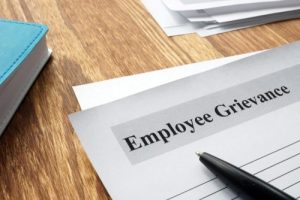Did you know: Grievance Top Tips

Sometimes employees raise a complaint about a workplace issue, if you have not had to deal with a workplace grievance before it can be difficult to know how to handle the matter. As part of our ‘did you know’ series in which we shine a spotlight on different areas of employment law, we take a quick look at some top tips for dealing with grievances.
Make sure you can spot a grievance
Grievances are concerns, problems or complaints that can be about a wide variety of matters including terms and conditions of employment, work  relations and equal opportunities. Whilst some grievances can be minor and may be capable of being resolved quickly on an informal basis between the employee and their manager, often grievances need to be addressed by following the company’s formal grievance procedure.
relations and equal opportunities. Whilst some grievances can be minor and may be capable of being resolved quickly on an informal basis between the employee and their manager, often grievances need to be addressed by following the company’s formal grievance procedure.
If an employee raises an issue in your organisation, it’s important to seek advice on the facts of your case from Kingfisher Professional Services Ltd before taking steps to address it.
Remember that appropriately dealing with a grievance can benefit your organisation
It can help to prevent matters from escalating and if there is merit in the employee’s grievance, provide an opportunity to remedy the issue/address the situation and take any necessary steps to try to prevent it occurring again.
Even if you don’t think the employee is right about what they are saying when they first raise the grievance, it’s still important to address it promptly and appropriately. If you don’t, not only is the matter likely to escalate but the employee may also complain that their grievance has not been dealt with. In some situations, this could lead to an uplift in the amount of a tribunal award if the employee goes on to successfully bring an employment tribunal claim, for example if they have a discrimination complaint. In some cases, an employee may try to argue that they have been constructively dismissed if their grievance is serious and has not been addressed.
Know how to manage a formal grievance process
Usually, addressing an employee’s grievance will involve inviting the employee to attend a grievance meeting, investigating the complaint and giving a written outcome and right of appeal. The employee will have the right to be accompanied at a grievance / appeal meeting by a colleague or a trade union representative if they wish.
Once a reasonable investigation into the matter has been completed, a decision will need to be made as to whether there is merit in the employee’s grievance or not. It will be necessary to consider all the information the employee has provided, including anything that has been said in the grievance meeting as well as the information that has been gathered in the investigation. This will need to be weighed up to determine whether there is merit in what the employee has raised. If the employee’s grievance is founded, it will be necessary to consider what steps are necessary to resolve the matter.
It’s important that the grievance outcome gives an appropriately detailed explanation of the decision that has been reached and the reasons for it. Remember, Kingfisher Professional Services are here to help, we can provide advice on dealing with grievances at all stages of the process.
Don’t forget that additional action may be needed
In some cases, it may be necessary to take additional action in connection with the grievance. This could for example be disciplinary action against another employee, if there is sufficient evidence of wrongdoing having occurred such as bullying or harassment. It’s important to get it right when it comes to taking such steps, Kingfisher Professional Services Ltd can give you advice on the facts of your case.
If you have a grievance matter or any employment law issue you would like assistance with in your organisation, please do not hesitate to contact Kingfisher Professional Services Ltd as we are happy to help.